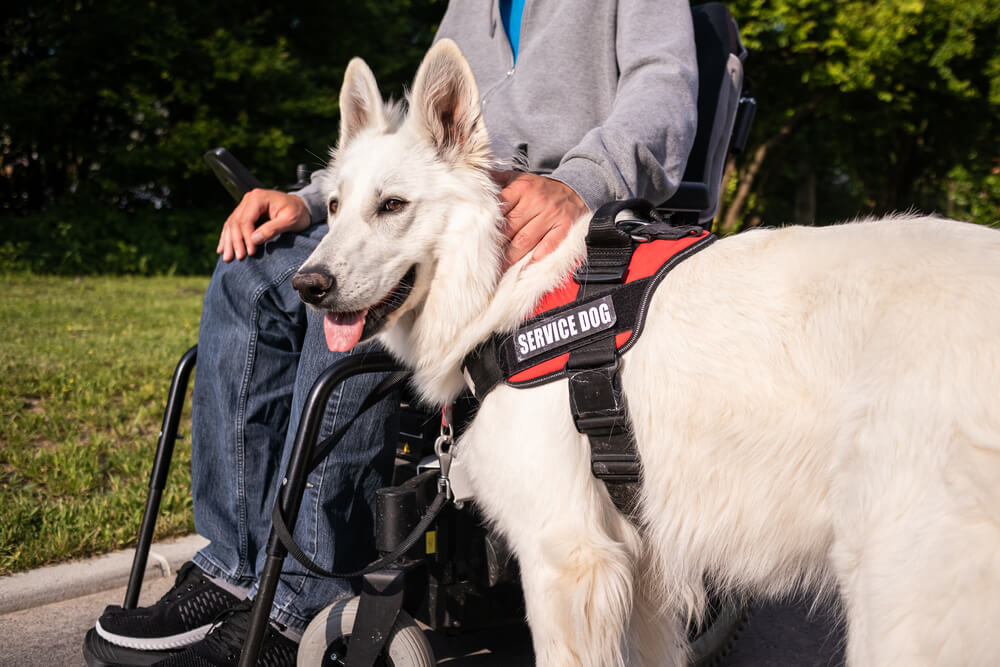
Find the resources you need by using keyword search and clicking enter or by filtering by category.
All Resources
join the community
VERIFIED businesses
Service Dogs
Service dogs can be an excellent resource for people with a disability. In fact, the Americans with Disability Act defines service animals as individually trained dogs to do work or perform tasks for people with disabilities. These loving animals can be another tool to assist a person with their daily tasks and increase independence by reducing reliance on other people. There are many types of service dogs out there, and each type offers a host of unique characteristics and benefits. Let’s learn about the various service dogs out there.
Dogs for visually impaired people
Seeing-eye dogs are for people who are legally blind (blind or have low vision) and can demonstrate the need for a guide dog to help them remain safe and effective in their everyday travel.
Unlike other service dogs, seeing-eye dogs practice selective disobedience. This means they obey commands but still make choices based on their assessment of a situation. For example, if their owner commands them to cross the street, the dog may disobey if cars are coming. If you are interested in a seeing-eye dog, visit the Guide Dog Foundation.
Dogs for hearing-impaired people
Hearing dogs are trained to assist a deaf or hard-of-hearing individual. When giving a particular cue to a hearing dog, it alerts its owner and leads them toward the noise, which includes smoke or fire alarms, doorbells, door knocking, phones, alarm clocks, and even the person’s name. If you want a hearing dog, visit the Hearing Dog Program for more information.
Medical alert dogs
Trained medical alert dogs assist individuals diagnosed with specific conditions such as:
- Seizures by alerting the person when a seizure may happen and assisting while the seizure is happening, including calling 911 or bringing medicine post-seizure.
- Diabetes: Specifically trained dogs to alert insulin-dependent diabetics of any potentially deadly blood sugar highs and lows so that they can treat it.
- Allergy Detection dogs are trained to alert people with severe allergies and help prevent them from going into anaphylactic shock.
- COVID-trained dogs can detect a person with COVID.
Dogs for mobility-impaired people
Trained dogs for mobility-impaired people assist with everyday tasks, including retrieving objects, opening doors, pressing automatic door buttons or elevators, and turning on lights. In addition, some dogs are trained to brace people with balance issues. Dogs trained to brace are generally larger dogs, 55+ pounds, and wear a specially fitted harness that helps them assist their owner.
Another type of mobility-trained dog assists people in wheelchairs. These trained dogs may help transfer a person to chairs, beds, and bathtubs, which, again, a dog wears a special harness that allows them to help pull their owners. Mobility-impaired people tend to be diagnosed with the following:
- Spinal cord injuries
- Brain injuries
- Muscular dystrophy
- Arthritis
- Cerebral palsy
Dogs for people with intellectual impairments
Trained dogs for people with intellectual impairments sense a negative change in their owner’s feelings. Psychiatric dogs help people navigate social settings by providing comfort. They can also serve as a physical barrier between their owner and other people to help preserve a person’s personal space, reduce anxiety, and build confidence. Furthermore, these dogs can force people to care for themselves and get out. It is important to remember that psychiatric service dogs differ from emotional support or therapy dogs. Psychiatric service dogs go through extensive training and are not considered pets under the legal definition. They help people with the following diagnoses:
- Autism
- Mental illness, including depression or anxiety
- PTSD (post-traumatic stress disorder)
Last but not least, facility dogs
Expertly trained facility dogs partner with a facilitator and work in a health care, visitation, or education setting. In fact, some courts are using dogs to help child witnesses. Facility-trained dogs can enhance therapies, promote participation, and reduce anxiety for clients in professional environments.
Are service dogs for everyone?
Not everyone qualifies for a service dog. Applicants need to demonstrate they meet the non-profit’s qualification standards. Remember that a service dog may be an option for one person but not another. Therefore, evaluate your situation, discuss it with your doctor, family, and friends, and decide based on your circumstances. If you are interested in a service dog, click on the links throughout this article to find a non-profit that can assist you.
STAGES is a resource for people as they age.
top verified companies
@2024 STAGES FOR LIFE, LLC. Designed Intentionally by MOK
information
sales@stagesforlife.com
Articles
Government
verified businesses
Medical Services
Get Verified
Contact
Privacy Policy
Terms and Conditions
Downsizing
Housing and Care Services
Non-Profit
Professional Services
Medical Services
Professional Services
Non-Profit
Housing & Care Services
Government
Downsizing
Events
Newsletter